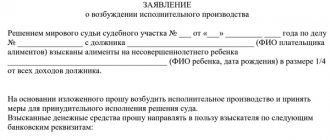Termination of child support obligations is possible upon reaching 18 years of age, or on other grounds expressly specified in the law. You can achieve termination of child support payments on the grounds set out in Art. 120 of the RF IC - as a rule, this happens in court. In this material we will analyze under what conditions the termination of alimony payments is allowed.
- Grounds for termination of payments
- Child's coming of age
- Death of a child or debtor
- Adopting a child
- Additional grounds for termination of payments
- When cessation of payments is not allowed
Termination of child support payments
There are many circumstances that lead to the termination of alimony payments. Some of them are being considered in court. Termination of alimony payments may occur for the following reasons:
- death of one of the parties to the agreement;
- expiration of this agreement (therefore this clause should always be specified in such agreements);
- when the ex-spouse removes his disability group;
- the child reaches the age of majority, or 23 years old if he is a full-time student).
Things are a little different when establishing alimony by court decision. In this case, the list of such circumstances will be slightly different.
Termination of alimony payments by court decision
The court may consider a claim to terminate alimony payments in the following situations:
- When adopting a child who was the recipient of these alimony payments. Since, after adoption, the payer of alimony is the legal parent and his rights to the child are equal to the obligation to support a minor child. Termination does not occur automatically, but only by court decision.
- When a child reaches a certain age or is recognized as fully capable (he is recognized upon marriage at the age of 16, concluding an employment contract, or engaging in entrepreneurial activity). He can become emancipated only with the consent of his parents, by the decision of the guardianship and trusteeship authorities. It is also permitted by court decision if there is no parental consent.
- In connection with the death of the recipient or sender of alimony. According to the laws of the Russian Federation, the right to pay alimony is personal in nature, and no one has the right to take on this obligation instead of the deceased person.
- When entering into a new marriage between former spouses or when the spouse’s ability to work is restored. If the spouse was previously disabled, and then the disability group was removed from him, then this fact requires confirmation by a special medical commission, which will issue an appropriate conclusion. The procedure for removing alimony obligations from a former spouse can only take place in court. The alimony payer must himself apply to the court with a claim to cancel the alimony payment.
Of the listed cases, only two require going to court, when restoring the former spouse’s ability to work and when adopting a child. In the remaining two cases, the rules for terminating enforcement proceedings apply. The bailiff who conducts the relevant proceedings in this case must issue a ruling to terminate the enforcement proceedings. A court order is sent to the court that made the decision to pay alimony, noting the fact of termination. Reducing alimony also requires filing a claim in court.
Algorithm of actions for canceling alimony
Going to court
You will need to initiate an appeal to the magistrates' court by filing a statement. It states the reasons why, in the applicant’s opinion, the amount of alimony requires revision. You also need to provide evidence.
The application should include the following information:
- the name of the judicial authority (you should contact the same court that in the past considered the case regarding the establishment of alimony payments);
- Full name of the applicant and defendant, residential addresses of the parties;
- circumstances for establishing alimony payments;
- circumstances for termination of financial support;
- request to cancel alimony payments;
- signature of the applicant, date of preparation of the document.
What documents are needed:
- passport;
- statement;
- court order (you will first need to make a photocopy).
What are the grounds for terminating alimony payments?
Alimony obligations of relatives are regulated by the Family Code of the Russian Federation. Material relations are maintained in some cases after the divorce. which requires their legal registration for a long period. This could be alimony for a minor child, an adult child with a disability, or a wife on maternity leave and caring for a child up to three years old. It is clear that alimony is paid for a long period, during which objective circumstances may arise to terminate obligations. All possible reasons for stopping the collection of alimony are described in Art. 120 IC RF.
Alimony for disabled adult children
In the current version of the Family Code, the obligation of parents to pay child support after 18 years of age is provided only for disabled adult children (Article 85 of the Family Code).
- Answer a few simple questions and get a selection of site materials for your case ↙
In addition, a parent who provides care for an adult common disabled child of group I is also entitled to alimony if he is recognized as low-income or unemployed and in need of support from the second parent. This norm is enshrined in Art. 89 of the Family Code of the Russian Federation.
Thus, alimony for adult children is assigned subject to the following conditions:
- The child has reached 18 years of age;
- Recognized as incapacitated;
- Needs care from parents;
- Not officially employed.
These facts must be confirmed by documents that will be submitted to the court when alimony is awarded.
In addition, a parent caring for a common disabled child since childhood has the right to receive alimony from the second parent under the following conditions:
- He is needy;
- Provides care for a common child who has been disabled since childhood, group I;
- An adult is officially, based on the conclusion of the MSEC, recognized as disabled since childhood of group I.
This is important to know: Payment period for maternity capital when purchasing an apartment
Alimony for an adult child is assigned, provided that one of the parents evades fulfilling his obligations to support an adult disabled child. In such a situation, the second parent applies to the court to order payments.
If both parents shirk their parental responsibilities, then the local guardianship and trusteeship authority can begin the procedure for assigning alimony.
At the same time, it will not matter much to the court whether the parents are married or a divorce has been filed. The judge will assess their financial situation, the facts of failure to fulfill their parental responsibilities, as well as the amounts necessary for the normal maintenance of a disabled adult child.
In accordance with Article 120 of the Family Code of the Russian Federation, assigned alimony for children after 18 years of age ceases to be paid under the condition:
- Restoration of working capacity;
- Death of the alimony payer or recipient.
Termination of payment of alimony for wife
Spouses are obliged to support each other financially; in some life situations, responsibilities continue after divorce. If the spouses separate during the wife's pregnancy, the husband is obliged to support her until the birth. After the birth of a common child, the mother is on leave to care for him for three years. Unable to work, she has the right to two types of payments: for herself (up to three years) and for her child (up to 18 years). Alimony payments to a spouse are also assigned if she has lost her ability to work within five years after the dissolution of a long marriage. When caring for a child with a Group 1 disability, the mother has the right to alimony throughout the disabled person’s life.
If an agreement is drawn up between relatives, then it must specify the conditions for the collection and termination of alimony payments. If the life situation changes and it is impossible to fulfill the terms of the agreement, one of the parties should apply to the court with an application for unilateral termination of the agreement. After a positive court decision, a claim is filed to assign or terminate alimony payments.
Registration of alimony for a disabled person after 18 years of age
To obtain alimony for an adult disabled child, it is necessary to prepare a certificate (conclusion) from the ITU confirming the fact of the child’s disability, in addition to the general list of documents:
- birth certificate or passport of an adult child;
- marriage or divorce certificates;
- applicant's passport;
- certificates of family composition from the place of permanent residence of the negligent parent.
This may be a conclusion from the MSEC, or a court decision establishing incapacity for work. And in case of registration of alimony for the parent caring for the child, you will need a certificate recognizing the child as disabled from childhood of group I.
All these documents are attached either to the payment agreement, when submitting it to a notary to perform a notarial inscription, or sent to the court along with a statement of claim for the recovery of alimony.
After receiving a court decision, a writ of execution is drawn up and sent to the bailiff service for further collection. And having received a notarial inscription, you can immediately go to the executors, since it is mandatory for execution.
Termination of child benefits
Child support ceases to be paid upon reaching the age of 18, unless the child is disabled. This is a general rule, but there are prerequisites for early termination of alimony relationships. If the child becomes legally competent before reaching 18 years of age, then based on the payer’s claim, the court will cancel the payments. Based on Art. 21 and art. 27 of the Civil Code of the Russian Federation, a citizen who marries before reaching the age of majority is considered legally competent. Even if a divorce follows, the law does not provide grounds for the resumption of alimony payments.
A child who has started working with official registration under the Labor Code of the Russian Federation cannot count on financial support from the parent. This does not include seasonal work and employment during the holidays. The start of a business activity registered with the Tax Service allows the court to refuse to collect alimony.
Cancellation of the penalty is possible in such cases only upon a statement of claim for termination of alimony by the payer, with a request to interrupt payments in connection with discovered circumstances. It should be noted that previously paid amounts cannot be claimed back; termination of payments is allowed after a court ruling is made.
If a child is adopted, payments stop. The new parent automatically assumes responsibility for the maintenance of the minor. Deprivation of parental rights is not grounds for canceling child support obligations. The court may reduce the amount of deductions, but it is unacceptable to eliminate them completely.
Alimony relations cease to operate if the payer is declared incompetent or has died. After the death of a parent living with the children, the receipt of alimony is transferred to the guardian or other relative who replaced the deceased. If the payer believes that the minor’s financial condition has improved, he has found himself in a wealthier family and comfortable living conditions, then it is possible to challenge the amount of payments in court, but it will not be possible to completely cancel alimony.
Grounds for dismissal of a claim
The judicial authorities are obliged to carefully study the circumstances of the case and make a decision at the end of the process. The plaintiff receives a refusal to terminate alimony payments in the following cases:
- the child has reached the age of majority, but is a disabled person of group 1 or 2 (he retains the right to be a dependent indefinitely);
- loss of a job or reduction in wages of a spouse, as well as retirement or disability (alimony payments are not subject to cancellation, but will be indexed according to income);
Read also: Children's health groups
A party that refuses to make payments or violates the terms of the contract cannot count on the cancellation of alimony obligations. The judiciary will be required to hold the plaintiff accountable.
How to formalize the termination of alimony
By law, the last day of payments falls on the eve of the child’s birthday, when he turns 18 years old. After this, the collection does not automatically stop; you should take the payment calculation from the enterprise’s accounting department and send it to the bailiff in charge of the case. The bailiff, having considered the application and the final accounting calculation of payment obligations, issues a resolution to terminate the collection of alimony. The resolution is sent to interested parties and to the accounting department of the enterprise to cancel the transfers.
If the child has become legally competent but has not reached the age of 18, the payer should file a claim in court in connection with the circumstances that have emerged. The application must be supported by documents, for example, a marriage certificate or a certificate from the child’s place of work. At the end of the alimony case, the debt obligations of the payer must be considered. After 18 years of age, the child himself has the right to claim in court the alimony debts remaining after the end of payments. Before applying, you should obtain a certificate from the FSSP, which includes all information on debts, penalties and fines.
The court, having received a claim from an adult, orders repayment of the debt in a fixed amount and the procedure for execution. The defendant may appeal the court decision within the established time limits to higher authorities. The court may reduce the debt or cancel it by considering the circumstances of the citizen’s financial and family situation. If it turns out that the payer transferred alimony, but the accounting department made a mistake in the recipient’s address or calculations, then the guilt is removed from him.
Termination of alimony obligations. Nine things you need to know
Good afternoon friends. Family law lawyer Evgeniy Volkov is with you. In this article I will tell you about the grounds for terminating alimony obligations.
It doesn’t matter whether we are talking about the termination of alimony obligations for children or the termination of alimony obligations between spouses - the law does not make any distinctions in this regard and provides uniform, general grounds for terminating alimony obligations.
By the way, before I forget, I recommend subscribing to my VKontakte community to keep abreast of important changes and updates on this topic.
Currently, all these grounds are concentrated in Article 120 of the Family Code of the Russian Federation. The list of grounds for termination of alimony obligations is exhaustive.
At the same time, I would not write this article just to quote you the contents of the article of the Family Code of the Russian Federation, which you can independently find on the Internet by typing, for example, in a search engine the phrase “grounds for termination of alimony obligations.”
The fact is that life is such a thing... it is impossible to provide for everything in the legislation, meanwhile, situations often arise in practice when continuing to pay alimony looks absurd.
I will tell you what these situations are and what to do in this case using an example from judicial practice later in this article.
But since I am used to telling everything in detail in each of my articles (see, for example, my article about reducing the amount of alimony), then first, let’s look in more detail at each of the grounds for terminating alimony obligations.
So, if you entered into an agreement to pay alimony, then the grounds for terminating alimony obligations in your case will be:
1. death of one of the parties to the alimony agreement; 2. expiration of the alimony agreement; 3. the grounds for termination of alimony obligations, provided for directly in the agreement on the payment of alimony.
According to paragraph 1 of Art. 120 of the Family Code of the Russian Federation
Alimony obligations established by an agreement on the payment of alimony are terminated by the death of one of the parties, the expiration of this agreement, or on the grounds provided for by this agreement.
That is, everything is clear here and you shouldn’t have any questions. If you have entered into an agreement to pay alimony, then in the future you do not need to run around the courts, prove something to the judge, etc.
At the same time, the parties to alimony obligations are not always willing to pay alimony voluntarily, and then the other party goes to court to collect alimony in court.
So, in this case (that is, when alimony is collected in court), the grounds for termination of alimony obligations are provided for in paragraph two of Art. 120 of the Family Code.
2. Payment of alimony collected in court shall be terminated:
upon the child reaching adulthood or in the event that minor children acquire full legal capacity before they reach adulthood; upon adoption of a child for whose maintenance alimony was collected; when the court recognizes the restoration of working capacity or the cessation of the need for assistance of the recipient of alimony; when a disabled ex-spouse who is the recipient of alimony enters into a new marriage; death of the person receiving alimony or the person obligated to pay alimony.
I propose to consider each of the specified grounds for termination of alimony obligations in more detail.
So, ground No. 1 is the child reaching adulthood.
It is a completely logical basis arising from other provisions of the Family Code of the Russian Federation. According to paragraph 1 of Article 21 of the Civil Code of the Russian Federation, a person who has reached 18 years of age is recognized as an adult.
In accordance with paragraph 1 of Article 80 of the Family Code of the Russian Federation
parents are required to support their minor children
Ground No. 2 is the acquisition by a minor of full legal capacity before reaching adulthood.
Full legal capacity can be acquired by a minor child on one of two grounds that are currently provided for in the Civil Code of the Russian Federation.
Clause 2 of Article 21 of the Civil Code of the Russian Federation
In cases where the law allows marriage before the age of eighteen, a citizen under eighteen years of age acquires full legal capacity from the time of marriage.
and paragraph 1 of Article 27 of the Civil Code of the Russian Federation
A minor who has reached the age of sixteen may be declared fully capable if he works under an employment contract, including a contract, or, with the consent of his parents, adoptive parents or guardian, is engaged in entrepreneurial activity.
I read quite a lot of a wide variety of legal literature on family law. So, some lawyers express a point of view about the imperfection of the law, which makes it possible to imperatively stop the payment of alimony by parents (parents) for children if they acquire full legal capacity before reaching the age of majority when a minor gets married.
In support of this position, an argument is given about a significant increase in material costs for minors who have started a family, which may require the provision of property support from their parents.
However, I consider such arguments far-fetched, since a minor citizen enters into marriage voluntarily and in any case is obliged to foresee its consequences, including those of a property nature.
Therefore, in such a situation, shifting the burden of maintaining a newly created family onto the parents of a minor spouse is groundless, which is probably what the legislator proceeded from when establishing Art. 120 of the Family Code of the Russian Federation, grounds for termination of alimony obligations.
The procedure for declaring a minor fully capable is currently provided for in Articles 287-289 of the Civil Procedure Code of the Russian Federation.
However, keep in mind that even if a minor child has reached full legal capacity, no court will satisfy your request to terminate child support obligations if you are found to be in arrears in paying child support. Author of the article: Evgeniy Volkov, https://evgeniyvolkov.ru
Where do these conclusions come from?
According to paragraph 1 of part 1 of Art. 47 of the Federal Law “On Enforcement Proceedings”
Enforcement proceedings are completed by the bailiff in the event of actual fulfillment of the requirements contained in the executive document
I have highlighted the key words in bold. Thus, even if the conditions provided for in paragraph 2 of Art. 120 of the Family Code of the Russian Federation, however, there is arrears in alimony payments, enforcement proceedings cannot be completed.
Therefore, the termination of enforcement proceedings for the payment of alimony upon the occurrence of the conditions defined in paragraph 2 of Article 120 of the Family Code of the Russian Federation, if there is a debt, will be unlawful.
This circumstance is also confirmed by judicial practice.
Determination of the Ardatovsky District Court of the Nizhny Novgorod Region dated March 13, 2012.
As can be seen from the enforcement proceedings for the collection of alimony from Ryabov S.Yu., his son A. is 18 years old.
At the same time, it is clear from the enforcement proceedings that on the day the child came of age and to this day, the debtor has an outstanding alimony debt in the amount of 168,729 rubles. 66 kopecksBy virtue of Part 1, Clause 1, Article 47 of the Law of the Russian Federation “On Enforcement Proceedings,” enforcement proceedings end with the actual fulfillment of the requirements contained in the executive document.
Consequently, the termination of enforcement proceedings for the payment of alimony upon the occurrence of the conditions specified in Part 2 of Article 120 of the RF IC, but in the presence of debt, is unlawful.
In this regard, the application regarding the termination of enforcement proceedings cannot be satisfied.
Also, despite the fact that the Family Code of the Russian Federation clearly connects reaching the age of majority with the termination of alimony obligations, in judicial practice there have been cases when an adult recipient of alimony studying at a university filed a lawsuit against his alimony provider with a demand to extend the payment of alimony until graduation. at the university.
So, for example, in one of the cases, a student (who had already reached the age of 18) filed a lawsuit to collect alimony from his father in a fixed amount of 4,200 rubles before he reached the age of 23.
The student justified his claim by the fact that he is the son of the defendant, previously received alimony from his father, is currently studying at the university and has difficulties finding a job, does not receive a scholarship and therefore continues to need financial support, since he needs funds to purchase clothes and food nutrition.
The regulatory justification for the statement of claim was simple: a reference to paragraph 1 of Art. 85 of the Family Code of the Russian Federation, as well as some articles of the federal law “On Labor Pensions”.
At the court hearing, the student explained that he is not a disabled person of groups 1, 2, 3 and does not receive a pension. I did not contact my father with a question about concluding an agreement on the payment of alimony, since I did not know where he lived.
The father has no alimony arrears; all alimony has been paid to him in full.
The father did not recognize the claims and asked the court to refuse to satisfy them. He indicated that he had fulfilled his obligations to support his son.
Regularly and without arrears he paid child support until he reached the age of 18. He believed that upon reaching adulthood, the plaintiff lost the right to receive alimony.
Refusing to satisfy the claim, the court indicated that the controversial legal relations that arose between the plaintiff and the defendant are regulated by Art. 85, 120 of the Family Code of the Russian Federation.
In accordance with Art. 85 of the RF IC, parents are obliged to support their disabled adult children who need help.
The above provisions of the law indicate that a child who has reached the age of majority has the right to demand through the court the recovery of alimony from parents in his favor only if the following three conditions are present in their totality:
- the adult child has a disability; - the need to receive financial assistance; - absence of an agreement on the payment of alimony in favor of an adult disabled child, concluded by him (or his guardian, if the child is incapacitated) and his parents.
The magistrate found the student plaintiff's arguments that he was incapacitated due to constant study to be unconvincing.
The concept of disability in relation to various types of legal relations is different. So, according to Law No. 173-FZ “On Labor Pensions in the Russian Federation,” men and women who have reached the ages of 60 and 55 years, respectively, and disabled people of groups I and II are disabled.
As it was established at the court hearing from the explanations of the parties and the evidence presented by them, the student’s age is 18 years.
He did not provide evidence of recognizing him as a disabled person of group I or II and, on the contrary, gave an explanation that he was absolutely healthy.
The plaintiff’s arguments that his father is obliged to ensure that he receives his first higher professional education and the need to obtain this education is an exceptional circumstance that gives the right to recover additional expenses in his favor are also untenable, since Part 2 of Art. 63 of the RF IC provides for the obligation of parents to ensure that their children receive only basic general education.
The magistrate also found the plaintiff’s arguments about the need to apply the analogy of Art. 9 “On Labor Pensions in the Russian Federation” since recognition of a person as a dependent - a disabled member of the family of a deceased breadwinner in relation to pension legal relations cannot mean recognition of a person as disabled in relation to family legal relations.
As a result, the student’s claim was denied.
Ground No. 3 - adoption of a child for whose maintenance alimony was collected.
This basis for termination of alimony obligations follows from the content of Articles 80 and 137 of the Family Code of the Russian Federation.
The fact is that adoptive parents in relation to adopted children are equal in rights and responsibilities to relatives by origin, that is, to parents. And the sacred duty of parents is to support their minor children.
According to Part 2 of Article 274 of the Civil Procedure Code of the Russian Federation
The rights and obligations of the adoptive parents (adoptive parent) and the adopted child are established from the date the court decision on the adoption of the child enters into legal force
The issue of termination of payment of alimony for an adopted child is resolved by the court in the manner prescribed by Article 440 of the Code of Civil Procedure of the Russian Federation according to the rules for termination of enforcement proceedings.
Why is that? But because a court decision on the adoption of a child that has entered into legal force is an unconditional basis for terminating the payment of alimony for him.
In addition, according to paragraph 17 of the Resolution of the Plenum of the Supreme Court of the Russian Federation dated April 20, 2006 No. 8 “On the application of legislation by courts when considering cases of adoption of children”
A court decision on adoption does not exempt the parent from whom alimony was collected in court from further payment, if upon adoption of a child this parent, in accordance with paragraph 3 of Article 137 of the RF IC, retained personal non-property and property rights and obligations (i.e. ... for the mother, if the adoptive parent is a man, or for the father, if the adoptive parent is a woman).
In this case, all issues related to changes in the amount of alimony collected, exemption from their payment, must be considered by the court in the manner of litigation at the request of interested parties.
Ground No. 4 – restoration of the alimony recipient’s ability to work.
This basis for terminating the collection of alimony must be established based on the results of re-examination of disabled people of groups I, II and III by medical and social examination institutions, based on a comprehensive assessment of the state of health and the degree of limitation of a person’s life activity.
Ground No. 5 - the cessation of the need for help from the recipient of alimony.
The issue of terminating the need of the recipient of alimony is decided by the court in each specific case, taking into account his financial and family status, as well as other circumstances worthy of attention.
In paragraph 22 of the Resolution of the Plenum of the Supreme Court of the Russian Federation dated October 25, 1996. No. 9 “On the application by courts of the Family Code of the Russian Federation when considering cases of establishing paternity and collecting alimony” it is explained that
Placement of a spouse receiving alimony from the other spouse in a home for the disabled on state support or transferring it to the support (care) of public or other organizations or private individuals (for example, in the case of concluding a contract for the sale of a house (apartment) with the condition of lifelong maintenance), may be the basis for exempting the alimony payer from paying them if there are no exceptional circumstances that make additional expenses necessary (special care, treatment, food, etc.), since by virtue of clause 2 of Art. 120 of the RF IC, the spouse’s right to receive maintenance is lost if the conditions that, according to Art. 89 of the RF IC, the basis for receiving maintenance.
The court in accordance with paragraph 1 of Art. 119 of the RF IC also has the right to reduce the amount of alimony paid under a previously made decision, taking into account the nature of additional expenses.
Ground No. 6 - the entry of a disabled ex-spouse in need of help - the recipient of alimony - into a new marriage.
The specified basis for termination of alimony obligations means that the responsibility for material support of a disabled ex-spouse in need of help is assigned to the spouse of the new marriage. This follows from paragraph 1 of Art. 89 of the Family Code of the Russian Federation
Spouses are obliged to financially support each other.
Ground No. 7 - death of the person receiving alimony or the person obligated to pay it.
Everything is simple here. The requirement to pay alimony or the obligation to pay it is of a purely personal nature and, therefore, under no circumstances can pass to the legal successor of the deceased person.
The present basis for termination of alimony obligations follows from Article 418 of the Civil Code of the Russian Federation
1. An obligation is terminated by the death of the debtor if fulfillment cannot be carried out without the personal participation of the debtor or the obligation is otherwise inextricably linked with the personality of the debtor.
2. An obligation is terminated by the death of the creditor if the performance is intended personally for the creditor or the obligation is otherwise inextricably linked with the personality of the creditor.
As I already indicated at the beginning of the article, the list of grounds for termination of alimony obligations provided for by the legislation of the Russian Federation is exhaustive.
But at the same time, sometimes life situations are such that the payment of alimony should be terminated, but the basis for termination is not provided by law.
In this case, the procedure for complete exemption from alimony payments, provided for in Art. 119 RF IC.
When are such cases possible and how should the date from which alimony payments cease to be determined? Here
example from judicial practice
Petrov P.P.
in March 2012, he appealed to the magistrate with a claim against Ivanova I.I. on exemption from payment of alimony paid to him for the maintenance of the minor Petrov I.P. from August 12, 2011. In support of the stated claims, the plaintiff indicated that by the decision of the Proletarsky District Court of Tula dated August 1, 2011, which entered into legal force on August 12, 2011, his claims to the defendant and the Civil Registry Office Committee of the city administration were partially satisfied. Tula on challenging paternity.The court established that he is not the father of I.P. Petrov, born on July 3, 2009.
Based on the court order of the magistrate dated December 1, 2009, Petrov P.P. is the payer of alimony for the maintenance of this child in favor of the defendant Ivanova I.I. in the amount of ¼ of the salary.
Voluntarily Ivanova I.I. after the entry of the court decision to challenge paternity, she refused to withdraw the court order from the Bailiff Service, which served as the basis for P.P. Petrov’s appeal. to the magistrate with a present claim for exemption from alimony payments from 08/12/2011.
The plaintiff did not appear at the court hearing; his interests were represented by a lawyer, who, supporting the reasons set out in the statement of claim, explained that her client and the defendant were married until October 8, 2010. During the marriage, on July 3, 2009, the couple had a child, I.P. Petrov.
12/01/2009 Ivanova I.I. received a court order to collect from Petrov P.P. child support in the amount of ¼ of all types of wages.
After some time, Petrov P.P. doubts arose regarding the paternity of the said child, they, with the consent of Ivanova I.I. A genetic study was carried out to determine paternity, which established that he is not the father of I.P. Petrov.
By the decision of the Proletarsky District Court of Tula dated August 1, 2011, it was recognized that Petrov P.P. is not the father of I.P. Petrova’s child.
The issue of terminating the existing disputes between Ivanova I.I. and Petrov P.P. alimony obligations were not raised or considered in the district court.
Later, the plaintiff contacted Ivanova I.I. by telephone. with a request to withdraw the writ of execution in order to stop paying alimony, but Ivanova I.I. refused to voluntarily perform these actions.
Defendant Ivanova I.I. partially recognized the claims and explained that she did not object to the release of P.P. Petrov. from paying alimony, since the court decision established that Petrov P.P. is not the father of her child, however, she objected to the date of termination of alimony obligations stated by the plaintiff, since for the specified period she received alimony, and therefore, termination of payment from August 12, 2011 would violate the rights of the child, since paid alimony is not subject to return .
In addition, the defendant referred to the fact that the plaintiff did not have any obstacles to clarify the requirements when considering the case on the merits in the district court, as well as in the period immediately after August 12, 2011, that is, the plaintiff himself did not initiate the issue in a timely manner about termination of alimony payments.
After hearing the parties and examining the written materials of the case presented by the parties, the magistrate came to the following conclusion.
In accordance with Art. 47 of the RF IC, the rights and obligations of parents and children are based on the origin of the children, certified in the manner prescribed by law.
Thus, legal relations (i.e., mutual rights and obligations) between parents and children arise in the presence of two conditions: the origin of the children from specific individuals; registration (certification) of the fact of birth of children from specific parents in the registry office.
In accordance with Art. 60 of the Family Code, a child has the right to receive maintenance from his parents (other family members) in the manner and amount established by Art. 80 - 120 SK.
Corresponding to this right is the obligation of parents to support their minor children (Clause 1 of Article 80 of the RF IC).
In turn, Part 1 of Article 119 of the RF IC establishes the procedure for exemption from alimony payments. In accordance with this rule of law, if, in the absence of an agreement on the payment of alimony, after the amount of alimony has been established in court, the financial or marital status of one of the parties has changed, the court has the right, at the request of any of the parties, to change the established amount of alimony or to release the person obliged to pay alimony from their payment.
When changing the amount of alimony or when releasing it from payment, the court also has the right to take into account other noteworthy interests of the parties.
As follows from the explanations of the Supreme Court of the Russian Federation contained in paragraph 24 of the Resolution of the Plenum of the Supreme Court of the Russian Federation dated October 25, 1996 No. 9 “On the application by courts of the Family Code of the Russian Federation when considering cases of establishing paternity and collecting alimony” when changing what was previously established by the court the amount of alimony for children and other family members, their collection in the newly established amount is carried out from the date of entry into legal force of the court decision made on this.
In accordance with Art. 119 of the RF IC, in addition to the financial and marital status of the parties, when releasing the alimony payer from paying them, the court may also take into account other noteworthy interests of the parties.
The exclusion of information about the father from the child’s birth certificate is such a worthy circumstance.
Due to the fact that by the decision of the Proletarsky District Court of Tula dated August 1, 2011, from the birth certificate of Petrov I.P. Born on 07/03/2009, information about P.P. Petrov was excluded. as a father, Petrova I.P. should be exempted from further payment of alimony from the date of entry into force of this court decision, since another date for termination of alimony payment will not correspond to the interests of the minor child for whose maintenance this payment was established by the court.
When determining the date the plaintiff was released from paying alimony, the magistrate proceeded from the fact that another date, including the one indicated by the plaintiff in the statement of claim, that is, August 12, 2011, would actually lead to a reversal in the execution of the court decision to collect alimony, so how alimony for the period from August 2011 to February 2012 has already been partially paid by the plaintiff to the defendant, in connection with which Ivanova I.I. should have returned everything that was paid to her for the specified period, however, the magistrate decided at the request of Ivanova I.I. the court order for the recovery of alimony was not based on false information or forged documents submitted by her, and therefore, there were grounds for the release of Petrov P.P. There is no payment of alimony from an earlier time.
In addition, the magistrate took into account that Petrov himself P.P. was not deprived of the opportunity to clarify the demands submitted by him to the Proletarsky District Court of Tula, supplementing them with a demand for exemption from payment of alimony for child support from the date the court decision on mating paternity entered into legal force, or immediately upon entry of the court decision to challenge paternity to the magistrate with this claim, but Petrov P.P. has such right. didn't use it.
This decision was appealed by the plaintiff to the appellate court, however, the higher court agreed with the conclusions of the magistrate and left the decision unchanged and the plaintiff’s complaint unsatisfied.
So, let me summarize all of the above. Currently, there are 9 grounds for terminating alimony obligations. Here they are:
1. the child reaches the age of majority; 2. acquisition by a minor of full legal capacity before reaching adulthood; 3. adoption of a child for whose maintenance alimony was collected; 4. restoration of the alimony recipient’s ability to work; 5. the cessation of the need for help from the recipient of alimony; 6. entry into a new marriage of a disabled ex-spouse in need of help - the recipient of alimony; 7. death of the person receiving alimony or the person obligated to pay it; 8. expiration of the alimony payment agreement; 9. the grounds for termination of alimony obligations, provided for directly in the agreement on the payment of alimony.
In conclusion of my article, I would like to note that in the procedure of claim proceedings, termination of alimony obligations is considered in the following cases:
- restoration of working capacity or cessation of the need for help from the recipient of alimony, since the payer of alimony must apply to the court with a claim to exempt him from further payment of alimony;
- adoption of a child, when the parent from whom alimony was collected in court retains personal non-property, property rights and obligations in relation to the adopted child;
- when it is necessary to exclude information about a parent from the child’s birth certificate, since the basis for the emergence of a child support obligation of parents in relation to a minor child is his origin, certified in the manner prescribed by law,
— a dispute regarding child support arises.
In other cases, termination of the payment of alimony collected in court on other grounds occurs according to the rules for termination of enforcement proceedings provided for in Article 440 of the Civil Procedure Code of the Russian Federation.
That is, the issue of termination of enforcement proceedings is considered by the court in the area of activity of which the bailiff performs his duties within ten days.
The collector, debtor, and bailiff are notified of this, but their failure to appear is not an obstacle to resolving these issues.
Based on the results of consideration of the application for termination of enforcement proceedings, the court issues a ruling, which is sent to the claimant, the debtor, as well as the bailiff who is enforcing the enforcement document.
In this determination, the judge usually indicates something like the following:
1. The bailiff's application to terminate enforcement proceedings No. ** is satisfied.
2. Terminate enforcement proceedings No. **, initiated on **.20__ by the bailiff of the bailiff department for the ______ district of the Federal Bailiff Service of Russia in the _______ region on the basis of the writ of execution No. ** dated ____, issued by the ______ district court of the ______ region in relation to A .T.P., due to ________.
3. Send a copy of the ruling to the claimant – T.I.A. and the bailiff.
I also note that a private complaint against a court ruling to terminate enforcement proceedings can be filed with a higher court through the court that issued the ruling within 15 days from the date the ruling was issued.
I hope my article will be useful to you in your practical activities. And that’s all the information I have for today.
Termination of the obligation to pay alimony
Natasha 01/3/2016 23:51
Termination of alimony payments occurs for a number of reasons and largely depends on who exactly they are issued to. For example, documents to support a wife are terminated if she has already returned from maternity leave or has remarried. Child support automatically terminates when the child reaches 18 years of age, with the exception of disabled children. Termination of child support for a child under 18 years of age is possible only if he became legally competent before he reached the age of majority.
Trosvaer 04/24/2017 04:09
Child reaching adulthood
One of the main responsibilities of parents, along with raising and educating a child, is his financial support. The period of its maintenance is enshrined in law from birth until the child reaches adulthood. The parent living separately from his son is obliged to pay him monthly financial support throughout this time. Moreover, this obligation cannot be refused or avoided.
If the child continues to receive full-time education, then collection of funds may continue until the age of 21. In addition, in the presence of debt, adults are not grounds for termination of enforcement proceedings.
The penalty may be terminated if the minor is emancipated. Emancipation means obtaining full legal capacity before the age of 18. This is possible if the daughter carries out entrepreneurial activities or labor activities under a contract or gets married. An act of a local government body or a court decision on emancipation is attached to the statement of claim for the cancellation of alimony.
What types of alimony are there?
It is believed that alimony is payments for the maintenance of a child. This understanding of the term is not entirely correct. They can be paid not only to the child, but also to the ex-wife if she is on maternity leave or for some other reason loses her ability to work, and to elderly parents. But the most common case in practice is still payments for a child, and they are made to the account of the former spouse (or a spouse or another family member, for example, a grandmother, with whom the minor lives). It turns out that this money is actually managed not by the child, but by his legal representative.
It happens that ex-husbands pay two types of alimony assigned as a result of an application to the court: for the child and for the spouse while she is on maternity leave to care for the child. If the family breaks up during the woman’s pregnancy, then the husband must pay alimony only to his wife. But after the birth of the child and the establishment of biological paternity legally, the mother can recover due payments from her ex-husband. In fact, he is the “culprit” for the birth of the baby, therefore he is obliged to support him.
In a situation with payments for a minor, payers are often interested in the question under what circumstances the payment of alimony stops. And there are several of them, and they depend on how alimony is collected: in court or paid voluntarily.
If there was an agreement to pay alimony
If, during a divorce, the former spouses managed to agree and draw up an agreement on the payment of child support, then there are three grounds for terminating alimony:
- death of one of the parties - the payer or the child;
- expiration of the agreement - it can be timed to coincide with the child’s coming of age, but other deadlines can be established, for example, if some real estate was transferred to the child as alimony;
- the occurrence of some events provided for in the agreement, for example, the remarriage of the former spouse or the transfer of a child back to the father for residence (or a violation of any term of the agreement).
Since the agreement is a legally binding document, it is not necessary to go to court to stop paying alimony. It is enough to pick up the agreement from the bailiff service or from the accounting department of the enterprise where the payer works.
But if the other party disputes some provision of the agreement, or if the agreement is not certified by a notary and is not legally binding, an application to the court may be required.
Adopting a child
One of the grounds for termination of alimony payments is the adoption of a child. It does not matter whether the adoption was carried out with the consent of the alimony obligee or without it (the parent is deprived of his rights).
Important! The financial support continues to be withheld if the child is under guardianship in a foster family.
The basis for termination when transferring a child to a foster family is solely a court decision on adoption that has entered into legal force. The document must be submitted to the court in order to obtain an exemption from paying alimony for minor children.
The Family Code provides for the possibility of maintaining responsibilities for financial support of a child after adoption. In accordance with Art. 137 of the RF IC, on the initiative of a single adoptive parent, it is possible to preserve the property and personal responsibilities of the parent in relation to the child.
If alimony was paid in court
The list of reasons for which the payment of alimony ordered in court is terminated is closed. This means that all cases of early termination of payments in favor of a child are provided for by law, and anything that goes beyond these conditions is not grounds for their termination. Moreover, the occurrence of these events does not mean automatic cancellation of alimony. In some cases, it is necessary to go to court or to the bailiff service.
So, the grounds for termination of alimony payments are:
- When a child reaches adulthood or acquires full legal capacity. As for legal capacity, it is acquired upon achieving certain conditions provided for in Articles 21 and 27 of the Civil Code. These include: getting married, getting a job under an employment contract, starting a business, and so on. The child's legal capacity is declared by the court. The payer must write an application to the court, in which he must indicate that he is asking to stop the collection of alimony on the basis of the child acquiring full legal capacity.
- Adoption of a child. In this case, responsibility for the maintenance of the minor falls entirely on the new parent, and the former payer is exempt from payment. However, if he was deprived of parental rights and, for example, was additionally prohibited from seeing the child, but no one adopted the baby, this does not relieve the obligation to pay child support. In fact, the child will be raised by another person, but the obligations for his maintenance from the point of view of the law fall on the biological parents. You can only write an application to the court demanding a reduction in the amount of payments, but there will be no termination of alimony.
- Death of the recipient or payer. It is clear that if there is no person, then there is no responsibility. Moreover, if the person who received money on behalf of the child died, then this should not affect the size and frequency of payments. The fact is that alimony is paid for the maintenance of the child, which means that the one who actually raises and provides for the minor has the right to receive it. If, for example, the mother died and the child is being raised by the grandmother, then she will receive money from the father. Another question is if the child’s financial situation has improved as a result. For example, the child was raised by his wife’s wealthier sister. In this case, in court, after filing the appropriate application, the amount of payments for the child may be reduced, but not cancelled.
By the way, in Western countries it is a common practice that after the death of the payer, alimony obligations pass to his heirs; in addition, his property can be arrested in favor of a minor if there are debts. In other words, there is no provision for termination of alimony until the child becomes an adult or has legal capacity.
Arbitrage practice
The case was considered by the Surgut City Court of the Khanty-Mansiysk Autonomous Okrug in April 2020.
The father filed a lawsuit with the Surgut City Court, in which he asked to be released from alimony obligations in relation to his daughter living with him, and to cancel the bailiff's order to calculate the amount of the debt. He motivated his demands by the fact that he had reached an oral agreement with the defendant. According to its terms, the daughter moves to the plaintiff, and the father deals with issues of her full provision. In turn, the mother refuses to receive alimony payments and withdraws the writs of execution from the bailiff service.
The plaintiff fulfilled his part of the agreement: he took his daughter with him and paid for her maintenance. The defendant did not withdraw the enforcement documents, thus the enforcement proceedings were not closed. This led to the father developing a child support debt, the amount of which was indicated by the bailiff in the decree calculating the amount of debt. The plaintiff considers this resolution illegal and asks the court to release him from fulfilling his alimony obligation.
At the court hearing, the defendant challenged the plaintiff’s claims, motivating her words as follows:
- The claim is an abuse of rights on the part of the former spouse who does not want to cover alimony debts.
- The claim cannot be considered in the city court, therefore, the applicant ignored the rules of jurisdiction.
The ex-spouse raises the question, in fact, about having his debt cancelled, and not about being exempt from paying alimony benefits in the future. The defendant explained this by the fact that her daughter was 22 years old at the time of the proceedings. Thus, the plaintiff does not need to be exempt from paying alimony since the daughter has already reached the age of majority.- The plaintiff is deceiving the court that there was an oral agreement with the defendant, and the minor daughter moved in with her father. The presence of the daughter in the defendant’s city of residence is confirmed by an insurance policy and a certificate issued after graduation.
- The plaintiff’s words that he paid for his adult daughter’s studies at the university are not relevant to the repayment of alimony debt, since at the time she entered the university she had reached the age of eighteen.
- When the daughter left for the plaintiff’s city of residence to get a higher education, the defendant insisted on her return and even sent money for the return trip. However, the daughter refused this offer because of the promises of her father, who offered her a salary for the period of her studies. According to his ex-wife, he did not stick to the words he gave, so she had to periodically send her daughter money for food.
At the court hearing, the daughter confirmed the defendant’s words and asked to refuse the plaintiff’s claims.
Having analyzed the arguments of the persons who took part in the proceedings and the documents presented by them, the judge decided to side with the defendant for the following reasons:
- Alimony was lawfully awarded by the magistrate in favor of the defendant for the maintenance of her daughter and was subject to recovery from the father.
- The plaintiff’s reference to an oral agreement between him and the defendant is void, since the law directly establishes the obligation of notarization of the alimony agreement.
- A certificate and insurance policy are sufficient evidence confirming the fact that a minor child lives with his mother.
- The residence of an adult child with his father and the plaintiff’s payment for educational services are not related to the alimony debt that arose when his daughter was less than eighteen years old.
- The bailiff began enforcement proceedings and calculated the debt when the plaintiff’s daughter was not yet eighteen years old. In addition, the plaintiff demanded a recalculation of the debt four years after his daughter came of age, although the law allows only ten days from the date of receipt for appealing the decisions of the bailiffs. Thus, the court considers the bailiff’s calculations to be correct and made within the scope of his competence.
When to stop paying spousal support
If payments were assigned to a spouse or elderly parents, then the termination of alimony collection may occur for one of three reasons:
- Restoring the ability to work of the recipient of alimony. For an ex-wife, this is usually three years from the birth of the child. The payer must file a claim to stop payments. Typically, courts quickly grant such requests unless the spouse provides convincing counter-arguments. The decision to restore working capacity is made by the court. If a spouse and a child were found to be in need of help, for example, during expensive treatment of a minor, when the father was assigned an increased amount of payments, then the cancellation of such obligations occurs as a result of an application to the court.
- Entry of a former spouse into a new marriage during the period when she was recognized as in need of assistance. Moreover, if a person does not enter into a legal marriage, but leads a joint household with the new spouse and lives together (the so-called civil marriage or cohabitation), then the court can apply the rule of Article 5 of the Family Code on the analogy of the law and recognize the existing relationship as marriage.
- Death of one side.
In these cases, there is no need to make contributions in favor of the spouse.
However, it is necessary for the payer or his representative to go to court.
The application must indicate the reasons for the termination of payments with all evidence attached.










